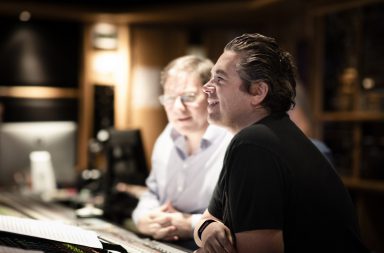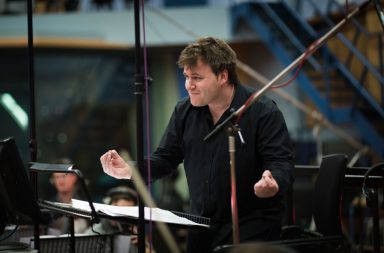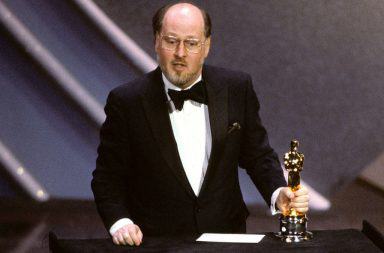If we were to sum up the idea behind the super collective Bleeding Fingers, we could say they are the “Avengers of film scoring.” Or maybe the label “X-Men of film music” would be more appropriate as Hans Zimmer, who scored the franchise’s latest installment Dark Phoenix, is behind this creative association with his long-term business partner, Steve Kofsky. Bleeding Fingers is lead by Russell Emanuel, an innovative music producer who has assembled an expert crew of over a dozen in-house composers, leading to an unmatched balance of musical creativity, collaboration and efficiency. Taking into account the fact that the work of a composer is quite a lonely venture, Emanuel had the drive to create a welcoming environment for young composers, by offering them a co-working space on Hans Zimmer’s world renowned campus, and thus allowing them to use state-of-the-art studios and providing them with an experienced production team.
Operating out of the twenty-studio Santa Monica facility on the same grounds as Remote Control Productions, the company is producing carefully-tailored scores for some of the most acclaimed series on television. In addition to Planet Earth II and Blue Planet II, Bleeding Fingers’ musical efforts include Fox’s The Simpsons, Netflix’s Roman Empire, Amazon’s American Playboy, and Crackle’s Snatch. We talked to Russell Emanuel and Andrew Christie, respectively co-score producer and lead composer on The Simpsons, about the importance of mutual-aid between composers, the cornerstone that Planet Earth II was for the company, and we of course talked about the challenge of taking over Alf Clausen and what it’s like to put music on the shenanigans of America’s wackiest family.
Score It Magazine: Can you tell us about the birth of Bleeding Fingers, and about the idea of creating a sort of “Avengers” team of composers?
Russell Emanuel: I like the idea of “Avengers” of film scoring, we might keep it! I have been working closely with Hans Zimmer for some years. I moved [to L.A.] in 2005 but I’ve known Hans for longer than that. Ever since 2005 we have been in the same facility [The Remote Control Productions facility]. I have an office on his compound of studios. We were looking for opportunities and we worked on different projects together. We were seeing amazing and exciting new talents coming through Hans’s studios. They got here because essentially they were dedicated to what they did. Exceptional talented musicians were coming through the facility and eventually moving on because there was a kind of natural glass ceiling of the established composers being here. The assistants would just move on because there was nowhere else to go. And we could see that we were losing an opportunity to capture these incredible talents. So we came up with this concept of an accelerator, a kind of “hot house,” for new composers, where we could get them scoring TV shows and big projects by providing them with tools that they wouldn’t necessarily be able to have that early on in their career. For example, state-of-the-art studios, producers, assistants of their own, a team handling the to-and-fro between them and the production, which generally take composers years to learn. All that is another set of skills. The skill of composing in one thing: it’s 50%. The other thing is dealing with the client and handling the politics. We are able to provide them with that. It was kind of a crazy idea but it caught on very quickly, and it’s been incredibly successful.
Your main goal was to provide young composers with a sort of “starting pack” but did you also take into account that the work of a composer can be quite lonely?
R. E.: I think that was a big part of what we wanted to achieve. We understood that by creating a collaborative space, we would give the production something very different. Being a composer, it is generally a very solitary life. We felt that it was important to create a team of composers with complimentary skills. When building this team, when adding someone new, the question was: what does this composer can bring to the team, that we don’t have already? I don’t want to say it in a negative way, but the world doesn’t need another Hans Zimmer. We already have him! We didn’t want to imitate, we wanted to innovate. Creating a balanced team—these “Avengers” as you were saying, well, every single one of them has a superpower. They have different backgrounds, the team is eclectic in nationality, we have four female composers that we are very proud of. We’re very keen on bringing female talents into the light.
I believe that Planet Earth II (2016) was quite a cornerstone in the development of Bleeding Fingers. Can you tell us about the before and the after?
R. E.: I’d say it came at a very natural time in our progression. We got Planet Earth II very early. I think it was in year 2 of the company’s history. We’re still very young, we’re just coming into our fifth year. In the first couple of years we were just discovering who we were. Although accelerated, we were “the new kid” for a while. Fortunately it didn’t last very long, and we were already doing some great shows at the time. But you are right, there was a before and an after Planet Earth. You can’t work on a show that huge and not feel the impact of it. We were very lucky and it was the perfect storm. The Planet Earth team was amazing to work with. They are a long-standing group of dedicated, essentially, scientists, in Bristol. They have spent 5 years making a landmark, blue-chip natural history show that was absolutely stunning and beautiful. Technology-wise, it comes such a long way since the first Planet Earth [which was aired in 2006] that it was a giant leap. Therefore, the challenge, musically, was daunting, and the team stepped up. We had 3 composers, Hans [Zimmer], Jacob [Shea] and Jasha [Klebe], it was a big team. We threw 100% of our ressources into it, knowing it was a cornerstone for our business. I think we worked on the show for almost a year, we had to pitch for it, they went out for the biggest and the best, and our team was selected. That was a very proud day for us! The day after the first broadcast, it felt like a tsunami of positivity. The response on social media was amazing, the phone kept on ringing.
How do you recrute your composers? Just before you said that the idea was to keep the composers who came to work on the facility. Do you still do that or do you scout for them in schools, do you have spontaneous applications?
R. E.: At the beginning, the process was indeed to retain composers here. It hasn’t really changed. Andrew was one of those composers. He worked for Lorne Balfe for a while.
Andrew Christie: Yes, I came to the Remote “school” and got an internship with Lorne Balfe for about a year and then went back to Australia. Then, Bleeding Fingers started up, and they gave me a chance.
R. E.: Interestingly enough there’s a number of ways people do approach us. We get a lot of recommandations—a lot of them Hans will find. For some reason he’s an incredible magnet for talent! Our composers are probably our best scouts for new talents as they understand what we’re looking for, the DNA of the company. Hans and the composers team, they scout for talents.
What’s your relationship with Hans Zimmer? Does he pop up around your office sometimes?
R. E.: We’re very close in distance indeed, probably 100 ft away. He’ll turn up in my office but most often I’ll turn up in his office, which is probably annoying for him! A lot of the times, he’s a producer on the shows we work on so he has his ears on a lot of the Bleeding Fingers’ work. Sometimes, he’s also a composer on the Bleeding Fingers work. So, he’s very involved.
Very concretely, how do you work? How do you share the workload between the composers? Do they help each others or are X and Y assigned to this project and that’s it?
R. E.: It’s interesting. So, we have a team of producers here—when we have a new show, we’ll assess what we want to achieve. Or after a creative conversation with the production, we will attempt to put a team together. They may have heard of one composer’s work, or we’ll build a team around a show. A lot of that comes from the producers team here.
Let’s talk about The Simpsons. Is it daunting to arrive on such a long-running show?
A. C.: It was incredibly scary and daunting! But very exciting at the same time.
I can imagine that The Simpsons can offer diversity in composition, given that you can have episodes with themes (Halloween, for instance, or episodes parodying film genres, music genres…). Can you tell us about this protean aspect of the show and all the possibilities that are offered to you as musicians?
A. C.: Oh yes, every week it’s something new. As a composer, you have to learn along the way and bring your right game. So many styles you have to switch from. There’s, of course, the Halloween episode that they do every year, The Treehouse of Horror. That can have 5 different genres in one episode—the music almost becomes a character in itself. We tend to have a little more time for this episode, that helps. My favorite episode from this season was Werking Moms [Season 30, episode 7] and we had a take on 1940s Parisian jazz! I had never written in that style before and it was incredibly rewarding. That was a real instance where we all came together in the end. That’s one of the big joys of doing it.
R. E.: Again, it speaks to the strength of this collaboration. The Simpsons is a show that we wanted, it was not handed to us. We have to pitch on all our projects. The Simpsons is a long-standing show that has made a change and we’ve managed to win them because of the strength of the collective. Having all these composers, even if they’re not all working on the show, all the composers are helping each other out. Andrew was talking about the Parisian jazz: well, someone had some knowledge, someone can help, someone can play the guitar in that style. I think it is very interesting and for me it is very gratifying to watch these young composers working on these world-renowned shows.
Andrew, is there then a fixed number of people working with you on The Simpsons?
A. C.: It was a bit more extended when we started but I am primary composer on the show now.
R. E.: We were working out to find who’d be our guy and it turned out to be Andrew. But again, as I said, they will kind of lean on each other for help.
A. C.: Indeed, there are times when you’re like, “Oh, I need this person to help me out on this!”
R. E.: Andrew has his assistants. There’s also myself and, most importantly, Hans, as score producers. So he has the support of Hans in this as well.
How long does it take to write the music for one episode?
A. C.: We’ll get the episode on a Thursday but we start work on Friday. We spot the episode and then we only have 3 days to write it because by next Friday we have to be recording. So essentially, 3/4 days of recording and orchestration, to get everything approved, do any revision that needs to be done, and then on Friday we record, and we’re back at doing all this all over again!
R. E.: It’s a crazy schedule, it’s one week per episode, usually.
What’s next in store for Bleeding Fingers?
R. E.: We’ve had some success in natural history, we have a number of natural history projects coming up, among which Seven Worlds, which is BBC’s Planet Earth property. After that, we’re lined up to do a few more of that but I can’t really talk about it! We also have a great scripted drama.
One last question: do the composers have to actually show you the blood on their fingers to be part of the team?
[They both laugh.]
A. C.: Yes! Well, when you have to write for 24 hours that can happen!
Interview prepared, conducted and transcribed by Marine Wong Kwok Chuen. Edited by Valentin Maniglia.





